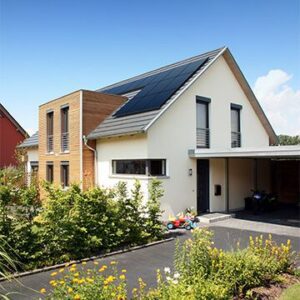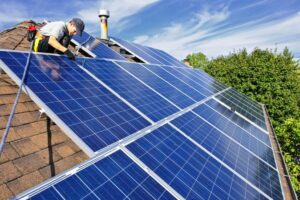Creating an Eco-Friendly Home in Singapore

Singapore is a bustling city-state that has made significant progress towards sustainability in recent years. One way that homeowners can contribute to this effort is by using solar panels to power their homes. In this article, we will explore the benefits of solar panels, how they work, and how to integrate them into your home.
Benefits of Solar Panels

1. Cost Savings
One of the primary benefits of using solar panels for homes in Singapore is cost savings. While the initial investment in solar panels may be expensive, over time, solar energy is significantly cheaper than traditional energy sources. This is because solar panels generate electricity from the sun, which is free and abundant. By using solar panels to power your home, you can reduce your reliance on the electrical grid and save money on your energy bills.
2. Increased Home Value
Homes with solar panels are becoming increasingly popular in Singapore, as more and more homeowners become environmentally conscious. Installing solar panels can increase the value of your home, as potential buyers will be attracted to the prospect of having a sustainable and cost-effective energy source. This means that if you decide to sell your home in the future, you may be able to command a higher price due to your solar panels.
3. Reduced Carbon Footprint
Solar panels generate electricity from the sun, which is a renewable and clean energy source. By using solar panels to power your home, you can significantly reduce your carbon footprint. This is because solar panels do not emit any harmful pollutants into the environment, unlike traditional energy sources such as coal and gas.
4. Low Maintenance
Solar panels have a lifespan of around 25 years and require little maintenance. This means that once your solar panels are installed, you can enjoy the benefits of clean and sustainable energy without having to worry about regular upkeep.
5. Energy Security
Using solar panels to power your home provides a degree of energy security. This is because solar energy is not subject to fluctuations in fuel prices or supply disruptions. By generating your own electricity, you can ensure that your home will always have access to power, regardless of external factors.
In conclusion, there are many benefits of using solar panels for homes in Singapore. From cost savings and increased home value to reduced carbon footprint and energy security, solar panels offer a sustainable and cost-effective way to power your home. With the help of a reputable solar panel installer, you can enjoy the benefits of clean and renewable energy for years to come.
How do Solar Panels Work
Solar panels work by converting sunlight into electricity. They are made up of photovoltaic (PV) cells, which are made from silicon. When sunlight hits the PV cells, it causes a flow of electrons, which creates a direct current (DC) of electricity.
This DC electricity is then converted into alternating current (AC) electricity using an inverter. AC electricity is the type of electricity that is used in homes and is compatible with the electrical grid. The electricity generated by the solar panels can be used to power your home, and any excess electricity can be sold back to the grid.
Integrating Solar Panels into Your Home

Integrating solar panels into your home in Singapore is an excellent way to reduce your carbon footprint, save money on energy costs, and increase the value of your home. Here are some steps you can take to integrate solar panels into your home:
1. Assess Your Energy Needs
The first step in integrating solar panels into your home is to assess your energy needs. This will help you determine the size of the solar panel system required to power your home. Factors such as the size of your home and your energy usage will determine the size of the solar panel system needed.
2. Find a Reputable Solar Panel Installer
The next step is to find a reputable solar panel installer. Look for a company with experience in installing solar panels in Singapore and check their credentials and reviews. They will be able to assess your home’s suitability for solar panels and recommend the best type of solar panel system for your needs.
3. Install the Solar Panels
Once you have chosen a reputable solar panel installer, they will install the solar panels on your roof or in your yard. The installer will ensure that the solar panels are correctly installed and connected to the inverter.
4. Connect to the Electrical Grid
Connecting your solar panels to the electrical grid will require the installation of a meter and a grid-tie inverter. The inverter converts the direct current (DC) electricity generated by the solar panels into alternating current (AC) electricity that can be used in your home. Any excess electricity generated by your solar panels can be sold back to the grid.
5. Enjoy the Benefits of Solar Power
Once your solar panels are installed and connected to the electrical grid, you can start enjoying the benefits of solar power. You will be able to power your home using clean and renewable energy, reduce your carbon footprint, and save money on energy costs.
Conclusion
Using solar panels to power your home is an excellent way to reduce your carbon footprint, save money on energy costs, and increase the value of your home. With the help of a reputable solar panel installer, you can integrate solar panels into your home and start enjoying the benefits of clean, renewable energy.
